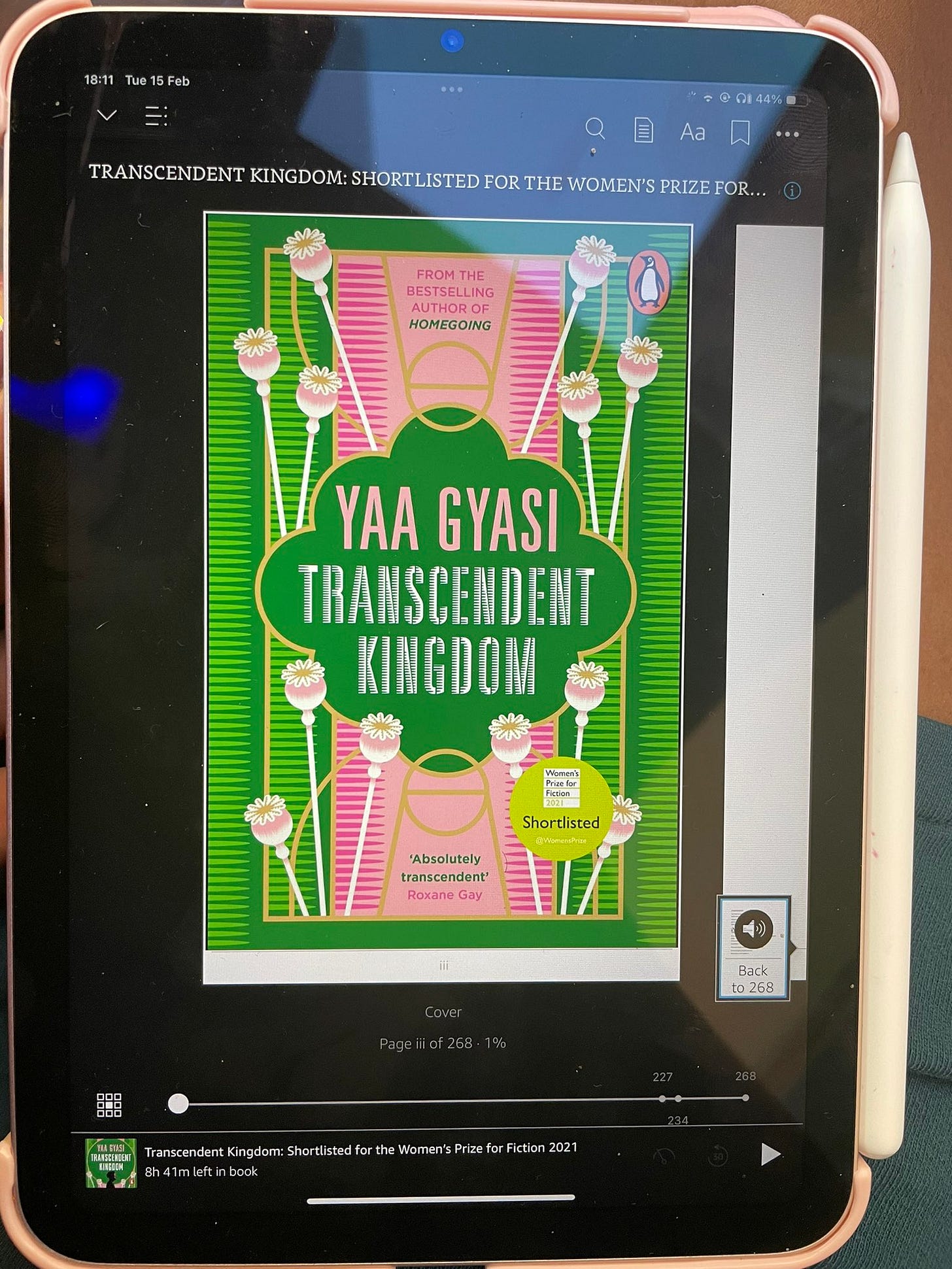Looking for something new to read? Transcendent Kingdom is transcendent.
My first experience with Yaa Gyasi’s work wasn’t entirely memorable. I started Homegoing and stopped barely halfway. No real reason beyond a decision to come back to it later. Which I never did. Then a few weeks ago, several years after my first time, I decided to read her second book, Transcendent Kingdom, which was shortlisted for the Women’s Prize for Fiction and has won a few other awards.
The novel tells of a PhD student, Gifty, investigating reward-seeking behaviour in mice to understand her family’s tragedy. Although she is from a religious family, she’ll battle with her beliefs throughout the novel. Her mother migrated from Ghana years ago, with her now late brother, Nana, to seek a better life for him. Her husband later came, then left her when America became too much for him. In the present, Gifty’s mother is battling depression, living with her daughter, not saying much or doing much. Although we don’t see or hear much of her interior, it’s clear that her son’s death affected her. Badly. In ways that words cannot describe.
Sometimes we don’t have the words to articulate our pain, but then we read and realise we were not looking for words. We were looking for understanding, some force to explain — no, justify — that pain to us. The why of the tragedy. Or someone to understand that pain with us. For us. In describing a protagonist in a quest for answers, I felt Yaa Gyasi helped me understand.
I relate to the novel in small and big ways: I grew up in church and at some point found the entire system oppressive enough to run away. I lived with a relative who battled with mental health issues in sometimes quiet and timid ways. But I’m not a scientist, and I absolutely wouldn’t touch mice. I’ve known heartbreak but not of a father who leaves you alone for years. And my migration story is different. So I read (and write) to enter and create other lives.
I love to peel layers off stories to find a one-sentence description of the story. It can be reductive but helpful to understand where the author started from. For Transcendent Kingdom, it’s two women trying to find answers to several questions. Like life, some of those questions will never have suitable answers. That’s why we go to religion, science, literature and all other forces to stabilise us in the fact we hold dear: some day, we’ll have all the answers.
You might enjoy reading this one for the writing, but the story will do something else for you.
A healthy approach to deadlines
This week, I saw a tweet about deadlines and how they’re artificial and shouldn’t control us to the point of burnout. The tweet rang true and reminded me of several things: how Jesus said man was not made for the sabbath but sabbath for man, and of how culture isn’t an arbitrary thing that we cannot change or evolve.
It also made me question the complex rules we make for ourselves. When letting your deadlines slip by, you ‘become’ ‘indisciplined’, but at what point is it doing what’s best for you and your mental health? It’s not always a thin line, but sometimes, it is.
In and out of professional settings, creatives are often considered lazy - for relying on ‘inspiration’. But I find that the structure of *some* professional settings forces us to work more with processes that can keep our creative juices flowing and work faster.
As I fall behind on my reading and writing goals (still at 14 of x books and 30k of x words), I actively pause to reflect on the consequences of failing. What does not meeting this deadline mean for me? Especially since it’s all personal — I’m not exactly reporting to anyone.
I don’t give myself rewards for succeeding. Neither am I punitive. Still I find that it’s helpful to have a guide for deadlines, and there are several on the internet: including setting SMART goals, to-do-lists and more
Here are three (out of several) things I figured out:
If you’re setting a personal deadline, you should have a good reason: don’t set a deadline for setting sake.
Set deadlines based on your strengths: be ambitious, but set deadlines based on prior experiences. How long has it taken me to work on this project before? And if you don’t know because you didn’t measure or because you don’t have experience with this kind of project, you should break the project into smaller chunks find out how long it’ll take the average person to work on each part.
Break up your project into smaller tasks and have deadlines for those smaller tasks: Instead of setting a goal to finish my book by June 2022, I would be better off setting smaller goals to write a certain number of words every week or month.
Have a great weekend. ❤️
All errors - mine.





